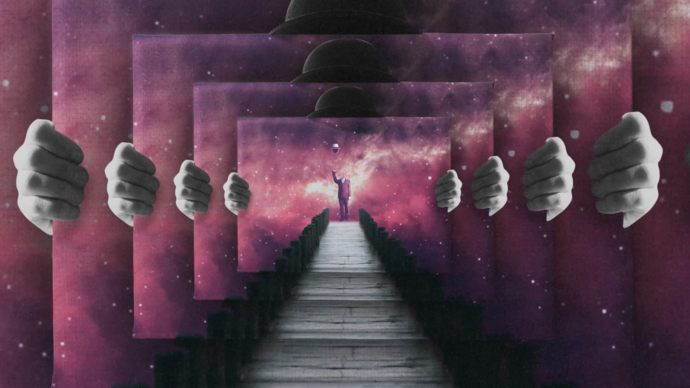Throughout 2019, we're exploring what it means to be human when technology is changing everything. To whet your appetite, we've curated a list of books investigating some of the themes from this Life Rewired season, all available to read for free in our Life Rewired Hub.
Curious about what we're reading? Take a look...
Weapons of Math Destruction: How Big Data Increases Inequality and Threatens Democracy, Cathy O’Neil *
We live in the age of the algorithm. Increasingly, the decisions that affect our lives - whether we get a job or a loan, how much we pay for insurance - are being made by mathematical models. In theory, this should lead to greater fairness- everyone is judged according to the same rules, and bias is eliminated. But as Cathy O'Neil reveals in this urgent and necessary book, the opposite is true.
24/7: Late Capitalism and the Ends of Sleep, Jonathan Crary *
This book explores some of the ruinous consequences of the expanding non-stop processes of twenty-first-century capitalism. The marketplace now operates through every hour of the clock, pushing us into constant activity and eroding forms of community and political expression, damaging the fabric of everyday life. Jonathan Crary examines how this interminable non-time blurs any separation between an intensified, ubiquitous consumerism and emerging strategies of control and surveillance.
‘Radical Technologies: The Design of Everyday Life‘, Adam Greenfield *
Everywhere we turn, a startling new device promises to transfigure our lives. But at what cost? In this urgent and revelatory excavation of our Information Age, leading technology thinker Adam Greenfield forces us to reconsider our relationship with the networked objects, services and spaces that define us. It is time to re-evaluate the Silicon Valley consensus determining the future.
‘The Great Derangement‘, Amitav Ghosh *
Are we deranged? The acclaimed Indian novelist Amitav Ghosh argues that future generations may well think so. How else to explain our imaginative failure in the face of global warming? Ghosh examines our inability at the level of literature, history, and politics to grasp the scale and violence of climate change. The extreme nature of today's climate events, Ghosh asserts, make them peculiarly resistant to contemporary modes of thinking and imagining.
‘Staying with the Trouble‘, Donna Haraway
In the midst of spiraling ecological devastation, multispecies feminist theorist Donna J. Haraway offers provocative new ways to reconfigure our relations to the earth and all its inhabitants. She eschews referring to our current epoch as the Anthropocene, preferring to conceptualize it as what she calls the Chthulucene, as it more aptly and fully describes our epoch as one in which the human and nonhuman are inextricably linked in tentacular practices.
‘Quantified: Biosensing Technologies in Everyday Practice', Dawn Nafus
What is at stake socially, culturally, politically, and economically when we routinely use technology to gather information about our bodies and environments? Today anyone can purchase technology that can track, quantify, and measure the body and its environment. Wearable or portable sensors detect heart rates, glucose levels, steps taken, water quality, genomes, and microbiomes, and turn them into electronic data. Is this phenomenon empowering, or a new form of social control? The book offers a range of perspectives, with views from the social sciences, cultural studies, journalism, industry, and the nonprofit world.
‘Alien Agency‘, Chris Salter
In Alien Agency, Chris Salter tells three stories of art in the making. Salter examines three works in which the materials of art—the 'stuff of the world'—behave and perform in ways beyond the creator's intent, becoming unknown, surprising, alien.
‘Never Let a Serious Crisis Go to Waste: How Neoliberalism Survived the Financial Meltdown‘, Philip Mirowski *
At the onset of the Great Recession, as house prices sank and joblessness soared, many commentators thought that neoliberalism itself was in its death throes. And yet it seems that - post-apocalypse - we've woken into a second nightmare more ghastly than the first: a political class still blaming government intervention, a global drive for austerity, stagflation, and exploding sovereign debt crises. Philip Mirowski argues that, as in classic studies of cognitive dissonance, neoliberal thought has become so pervasive that any countervailing evidence serves only to further convince disciples of its ultimate truth.
‘Dawn of the New Everything‘, Jaron Lanier *
Virtual Reality has long been one of the dominant cliches of science fiction. More than thirty years ago, legendary computer scientist, visionary and artist Jaron Lanier pioneered its invention. Here, in what is likely to be one of the most unusual books you ever read, he blends scientific investigation, philosophical thought experiment and his memoir of a life lived at the centre of digital innovation to explain what VR really is- the science of comprehensive illusion; the extension of the intimate magic of earliest childhood into adulthood; a hint of what life would be like without any limits.
‘Algorithms of Oppression‘, Safiya Noble
In Algorithms of Oppression, Safiya Umoja Noble challenges the idea that search engines like Google offer an equal playing field for all forms of ideas, identities, and activities. Data discrimination is a real social problem; Noble argues that the combination of private interests in promoting certain sites, along with the monopoly status of a relatively small number of Internet search engines, leads to a biased set of search algorithms that privilege whiteness and discriminate against people of color, specifically women of color.
‘Cybernetics‘, Norbert Wiener
Norbert Wiener—A Life in Cybernetics combines for the first time the two volumes of Norbert Wiener's celebrated autobiography. Published at the height of public enthusiasm for cybernetics—when it was taken up by scientists, engineers, science fiction writers, artists, and musicians—Ex-Prodigy (1953) and I Am a Mathematician (1956) received attention from both scholarly and mainstream publications, garnering reviews and publicity in outlets that ranged from the New York Times and New York Post to the Virginia Quarterly Review.
‘The Cybernetic Brain‘, Andrew Pickering
Cybernetics is often thought of as a grim military or industrial science of control. But as Andrew Pickering reveals in this beguiling book, a much more lively and experimental strain of cybernetics can be traced from the 1940s to the present. Psychiatry, engineering, management, politics, music, architecture, education, tantric yoga, the Beats, and the sixties counterculture all come into play as Pickering follows the history of cybernetics’ impact on the world, from contemporary robotics and complexity theory to the Chilean economy under Salvador Allende.
‘I Am a Strange Loop‘, Douglas Hofstadter
Can thought arise out of matter? Can self, soul, consciousness, I arise out of mere matter? If it cannot, then how can you or I be here? I Am a Strange Loop argues that the key to understanding selves and consciousness is the strange loop",a special kind of abstract feedback loop inhabiting our brains. The most central and complex symbol in your brain is the one called I. These are the mysteries tackled in I Am a Strange Loop.
Down to Earth, Bruno Latour
The present ecological mutation has organized the whole political landscape for the last thirty years. This could explain the deadly cocktail of exploding inequalities, massive deregulation, and conversion of the dream of globalization into a nightmare for most people. What holds these three phenomena together is the conviction, shared by some powerful people, that the ecological threat is real and that the only way for them to survive is to abandon any pretense at sharing a common future with the rest of the world. Hence their flight offshore and their massive investment in climate change denial.
The Mushroom at the End of the World, Anna Lowenhaupt Tsing *
Matsutake is the most valuable mushroom in the world--and a weed that grows in human-disturbed forests across the northern hemisphere. Through its ability to nurture trees, matsutake helps forests to grow in daunting places. It is also an edible delicacy in Japan, where it sometimes commands astronomical prices. In all its contradictions, matsutake offers insights into areas far beyond just mushrooms and addresses a crucial question: what manages to live in the ruins we have made? A tale of diversity within our damaged landscapes, The Mushroom at the End of the World follows one of the strangest commodity chains of our times to explore the unexpected corners of capitalism.
The Age of Surveillance Capitalism: The Fight for a Human Future at the New Frontier of Power, Shoshana Zuboff *
Shoshana Zuboff shows that we are at a crossroads. We still have the power to decide what kind of world we want to live in, and what we decide now will shape the rest of the century. Our choices: allow technology to enrich the few and impoverish the many, or harness it and distribute its benefits.
Unthought: The Power of the Cognitive Nonconscious, N. Katherine Hayles
N. Katherine Hayles is known for breaking new ground at the intersection of the sciences and the humanities. In Unthought, she once again bridges disciplines by revealing how we think without thinking—how we use cognitive processes that are inaccessible to consciousness yet necessary for it to function.
Beautiful Data: A History of Vision and Reason since 1945, Orit Halpern
Beautiful Data is both a history of big data and interactivity, and a sophisticated meditation on ideas about vision and cognition in the second half of the twentieth century. Contending that our forms of attention, observation, and truth are contingent and contested, Orit Halpern historicizes the ways that we are trained, and train ourselves, to observe and analyze the world. Tracing the postwar impact of cybernetics and the communication sciences on the social and human sciences, design, arts, and urban planning, she finds a radical shift in attitudes toward recording and displaying information.
The Sixth Extinction: An Unnatural History, Elizabeth Kolbert *
Over the last half a billion years, there have been five mass extinctions of life on earth. Scientists around the world are currently monitoring the sixth, predicted to be the most devastating extinction event since the asteroid impact that wiped out the dinosaurs. Elizabeth Kolbert combines brilliant field reporting, the history of ideas and the work of geologists, botanists and marine biologists to tell the gripping stories of a dozen species - including the Panamanian golden frog and the Sumatran rhino - some already gone, others at the point of vanishing.
Synthetic: How Life Got Made, Sophia Roosth
In Synthetic: How Life Got Made, cultural anthropologist Sophia Roosth reveals how synthetic biologists make new living things in order to understand better how life works.
* These books are available in the Barbican Shop and/or the Barbican Library.






